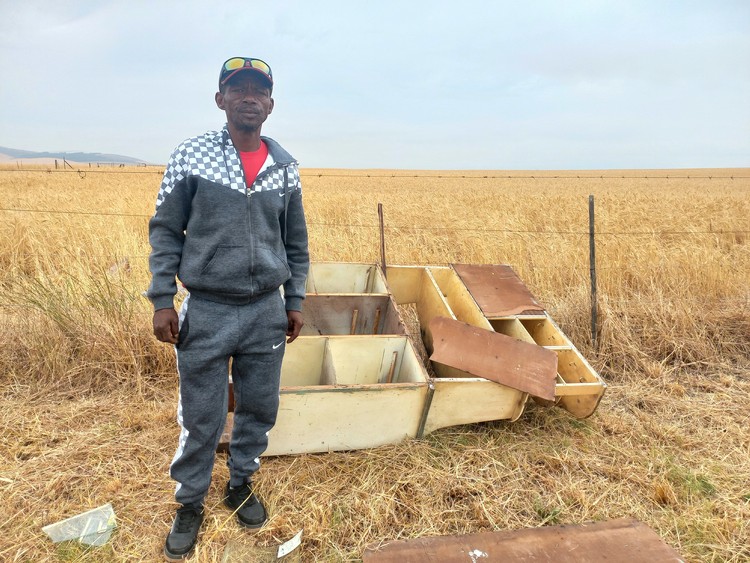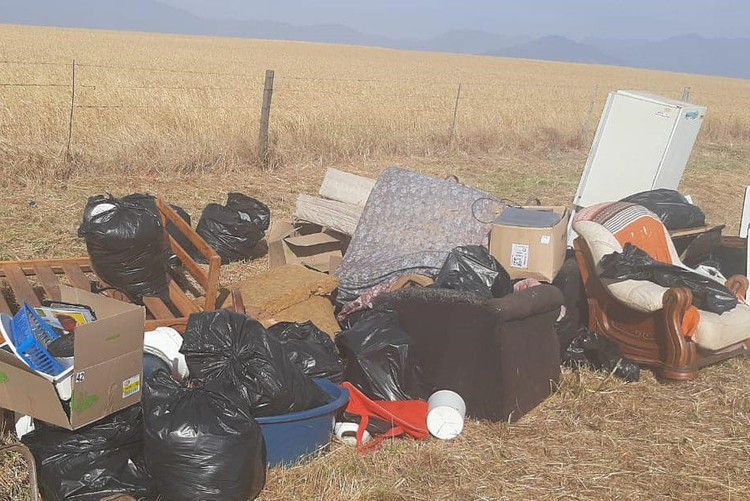Farm worker family evicted, belongings dumped on the side of the road
“I am broken” says Jan Marthinus, in tears after his family was left homeless
Farm worker Jan Marthinus standing with the cupboard which was dumped next to the road between Malmesbury and Paarl. Photo: Marecia Damons
- A Cape Winelands farmworker and his family have been living in a library in Paarl after they were evicted from the farm house where they had lived for more than 20 years.
- Jan Marthinus and his wife were at work on a different farm in Stellenbosch on Thursday when their belongings were removed from the house where they lived and dropped beside the R45 between Malmesbury and Paarl.
- The family have been temporarily housed at the Groenheuwel Library by the Drakenstein Municipality.
A Cape Winelands farm worker returned from work on Thursday to find his family’s belongings dumped by the side of the R45 between Malmesbury and Paarl.
In March, the Land Claims Court in Randburg ordered the eviction of farm worker Jan Marthinus and his family from the two-roomed house they had lived in for more than 20 years on Ongegund Farm.
Marthinus started working at Ongegund in 1999. He was fired in 2013 but continued living on the farm while he worked elsewhere. The court granted an application by farm owner Gerhardus Visser to have the family evicted and gave them until 1 September to leave the house. If they did not, the Sheriff of the court was ordered to evict them on 4 September.
Marthinus said the eviction took him by surprise. He had been given court papers earlier this year but had not understood them because they were in English and he only speaks Afrikaans. “I can’t read English. All I know is ‘yes and no’,” he said (we have translated his speech).
“I wasn’t aware of the eviction. My wife and I were busy working at a farm in Stellenbosch.”
Marthinus said he was taken aback on Thursday when his current employer phoned him to ask if he could give his number to Visser.
“I said yes, but then it wasn’t Gerhardus [Visser] on the phone, it was the police. They told me they already loaded my things and private security were there with two vans and were going to leave my things next to the road,” said Marthinus.
He said he got a lift from Stellenbosch to Paarl and then walked for more than two hours to the R45 where he saw his children sitting next to their belongings on the roadside. “I am broken,” he said tearfully.
His bed and cupboards were broken and the family cannot find their identity documents, he said.
“My daughter was still hanging up washing when they came. She had to throw the wet washing in a bag. We had to throw away our meat,” said Marthinus.
The Marthinus family’s belongings were dumped by the side of the road after they were evicted. Photo: supplied
The eviction order did not contain any instruction to the Drakenstein Municipality to provide the family with alternative accommodation. Seraj Johaar, Drakenstein Municipality’s executive director for corporate services and planning services, said the municipality had found them temporary accommodation “on humanitarian grounds”.
Marthinus and his family are currently living at Groenheuwel Library in Paarl, about 20 kilometres from the farm. “There’s beds, a toilet and a basin, but no shower. I had to wash in a bucket last night,” he told GroundUp on Friday.
Johaar said the library was the only option at such short notice. He said the family did not qualify for alternative housing assistance in terms of the municipality’s Temporary Housing Assistance Policy.
“This determination was based on the combined household income. This was communicated to the legal representatives of the household and the court,” he said.
According to the Drakenstein municipal housing policy, emergency housing is provided for families earning less than R3,500 a month “and/or who are evicted from rural properties … or from urban accommodation” with a court order.
“Their future accommodation will be carefully considered and discussed with them,” said Johaar.
Women on Farms Project’s Carmen Louw said those evicted from farms often did not understand the process. But, she said, in terms of the seminal Grootboom case handed down by the Constitutional Court in October 2000, no eviction could take place unless there was alternative accommodation.
Billy Claasen of the Rural and Farmworker Development Organisation, who was assisting the Marthinus family on Thursday, said it was “inhumane” to move people from their homes to an area they did not know.
“Whether it’s legal or illegal, it remains inhumane.” He said this should be taken into account before orders were granted to evict people.
GroundUp phoned Visser twice for comment but he hung up. We also sent him a WhatsApp asking for comment, but he had not responded by the time of publication.
The sheriff’s office in Wellington declined to comment on the eviction.
Support independent journalism
Donate using Payfast

Don't miss out on the latest news
We respect your privacy, and promise we won't spam you.
© 2023 GroundUp. This article is licensed under a Creative Commons Attribution-NoDerivatives 4.0 International License.
You may republish this article, so long as you credit the authors and GroundUp, and do not change the text. Please include a link back to the original article.
We put an invisible pixel in the article so that we can count traffic to republishers. All analytics tools are solely on our servers. We do not give our logs to any third party. Logs are deleted after two weeks. We do not use any IP address identifying information except to count regional traffic. We are solely interested in counting hits, not tracking users. If you republish, please do not delete the invisible pixel.


